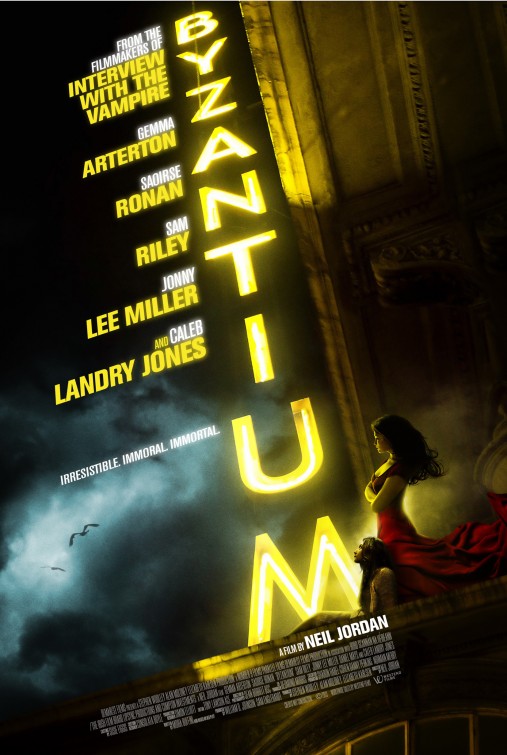Irresistible. Immoral. Immortal.
Director
Neil Jordan
Starring
Saorise Ronan
Gemma Arterton
Caleb Landry Jones
Daniel Mays
I think we can all agree that vampire lore and mythology is in a complete state of flux. The classic garlic, crosses, sunlight, stake through the heart stuff is considered dated, replaced by analyses of isolation and loneliness. What was originally a sexually charged representation of control is now a sombre retrospective groan of loss and grief.
The story follows a mother/daughter vampiric duo as they evade pursuers and try to live some sort of life. Clara [Arterton] earns cash on her knees and her back in the hope to keep her daughter, Eleanor [Ronan], sheltered from such depraved resorts. Having to start over in a seaside town, Clara befriends the grieving Noel [Mays], who has recently lost his mother and inherited her guesthouse. Clara manipulates Noel to let the women stay and slowly begins to turn the building into a brothel. At the same time, the quiet, introverted Eleanor longs to tell the truth about her life. Upon arrival, Eleanor immediately recognises the town as that of her birth and notices the orphanage she grew up in, is now a college. Sitting in on a few creative writing lessons, Eleanor is encouraged to write about her life and proceeds to do so, sharing it solely with the unusual Frank [Landry Jones]. In her story, she explains her existence as a vampire, how she came to be and her wretched opinion of her mother’s control and paranoia (which the audience is then shown). Meanwhile, two vampires follow a trail of bodies, in the relentless pursuit of Clara and her ‘abomination’ daughter.
By telling a supernatural love story with harsh realities of life thrown in, Byzantium tries to beat Twilight at its own game. Unlike the Twilight Saga, this film feels more mature, like it actually has something to say, briefly touching on the concept that the very nature of immortality robs people of what it is to be human, emotionally and mentally. Yet this message is never really driven home – not to mention completely dismissed by the end of the film – leaving me neither bored, nor thrilled. And this is probably the biggest problem with Byzantium, it’s a very frustrating film that offers glimpses of something dark, profound and disturbing but languishes sluggishly trying to figure out what to do with itself. Nowhere near as good as Let The Right One In but still better than most attempts. This largely comes down to the decent pairing of Neil Jordan’s direction and Sean Bobbitt’s cinematography work. The narrative also goes hand-in-hand with the eerie grime of the setting. Being a city boy, I find coastal/seaside towns odd, a strangely obsolete Victorian relic in disrepair riddled with crime and despair. To top it all off, Javier Navarrete’s score is a sullen, forlorn and perfectly fitting treat for the tonality of the story. Touching on similar lullaby melodies and waning strings used in Pan’s Labyrinth, there’s something delightfully sorrowful in each progressing note.
Based on a play, it’s evident that the lead roles are crucial above all else. Arterton, who usually annoys the hell out of me, was actually pretty commendable here. I’m not saying that simply because she’s presented as all cleavage and leg in this film, more because her compassion and desperation comes across so completely in her performance. Equally, Ronan’s meek silence and floods of tears constantly held behind her eyes were captivating and indicative of any individual trapped in a life forced upon them. Then we hit a bit of a stumbling block. I appreciate the two leads are well written and decently acted but all the male supports are two dimensional and unengaging. Some would argue that this is merely a role reversal of.. however many centuries of female portrayal in gothic literature but that’s not exactly an excuse. I couldn’t really figure out what Landry Jones was going for – both his character and portrayal felt very out of place and then there was the simplistic juxtaposition between Sam Riley, the kind man, and Jonny Lee Miller, the mean one. The closest we get to an actual human embodiment is Noel but his simpering never actually ends and descends from plausible to pathetic.
Despite the singular elements, the acting, the touching score, the keen directing and a few compelling sequences, the entire film feels somewhat dull. One could easily chalk this up to inferior writing but I think it may go beyond that. I believe audiences are simply growing apathetic to the whole vampire concept, in all its forms and guises. As such, all on-screen stories and incarnations try to either revamp (is that a pun? Sure, why not) the mythology or ignore it altogether in an attempt to do something different, forgetting that the story should be the primary focus. Neglecting that, all we’re left with is a handful of decent scenes and performances and little else.
Release Date:
31st May 2013
The Scene To Look Out For:
I’m not entirely sure how to describe it but the sequences set in the hermit’s stone shack, were definitely the highlight. Each vampire is led down into a small sinister structure on a remote island and confronted by.. well, it’s never explained but their transformation happens there. It’s different and unsettling but despite the use of bleeding waterfalls and doppelgangers, makes about as much sense as sucking each other’s blood to live forever.
Notable Characters:
Both Arterton and Ronan stand out as fine actresses and were this project of the scope and scale of Interview With The Vampire, I could imagine they would have really run with these creations. Conveying centuries of frustration, pain and hatred is an arguably impossible task but these two somehow make it believable. Which, let’s face it, is the biggest compliment one can pay a thespian.
Highlighted Quote:
“The pearl stays perfect forever, while the flesh around it rots”
In A Few Words:
“A uniquely tender yet expectedly visceral take on a ragged gothic subgenre”
Total Score: 3/5
![The Red Right Hand Movie Reviews [Matthew Stogdon]](https://reviews.theredrighthand.co.uk/wp-content/uploads/2021/12/cropped-header1.png)




